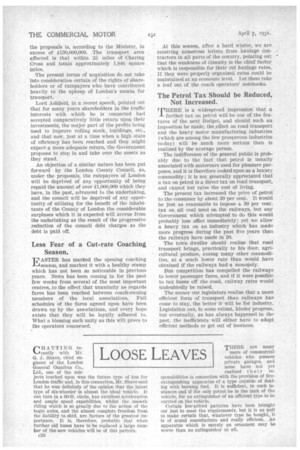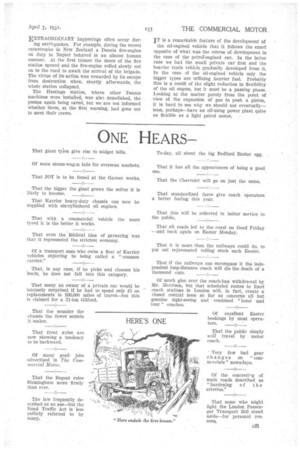OHATTING re'LA cently with Air. G. J. Shave, chief engineer
Page 58

Page 59

If you've noticed an error in this article please click here to report it so we can fix it.
of the London General Omnibus Co., Ltd., one of the subjects touched upon was the future type of bus for London traffic and, in this connection, Mr. Shave said that he was definitely of the opinion that the latest type of six-wheeler is almost the ideal vehicle. It can turn in a 60-ft. circle, has excellent acceleration and ample speed capabilities, whilst the smooth riding which is so greatly due to the action of the bogie axles, and the almost complete freedom from the liability to. skid, are factors of the greatest importance. It is, therefore, probable that when further old buses have to be replaced a large number of the new vehicles will be of this pattern. THERE are many users of commercial vehicles who possess private garages, and some have not yet realized their responsibilities in connection with the provision of fireextinguishing apparatus of a type capable of dealing with burning .fuel. It is sufficient, in such instances and if the only petrol be in the tank of the vehicle, for an extinguisher of an efficient type to be carried on the vehicle.
Certain low-priced Patterns have been brought out just to meet the requirements, but it is as well to make certain that, whatever type be bought,, it is of sound manufacture and really efficient.: An apparatus which is merely an ornament may be worse than no extinguisher at all. EXTRAORDINARY happenings often occur dur ing earthquakes. For example, during the recent catastrophe in New Zealand a Dennis fire-engine on duty in Napier behaved in an almost human manner. At the first tremor the doors of the fire station opened and the fire-engine rolled slowly out on to the road to await the arrival of the brigade. The virtue of its action was rewarded by its escape from destruction when, shortly afterwards, the whole station collapsed.
The Hastings station, where other Dennis machines were installed, was also demolished, the pumps again being saved, but we are not informed whether these, at the first warning, had gone out to meet their crews. IT is a remarkable feature of the development of the oil-engined vehicle that it follows the exact opposite of what was the course of development in the case of the petroT-engined car, In the latter case we had the small private car first and the heavier trade vehicle gradually developed frota it. In the case of the oil-engined vehicle only the bigger types are utilizing heavier fuel. Probably this is a result of the slight reduction in flexibility of the oil engine, but it must be a passing phase. Looking at the matter purely from the point of view of the expansion of gas to push a piston, it is hard to see why we should not eventually— soon, perhaps—have an oil-using power plant quite as flexible as a light petrol motor.




























































































































